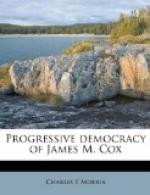In the state in which Governor Cox held leadership there was no doubt. His own Ohio knew long ago that at the Democratic National Convention in San Francisco its chosen spokesmen would communicate but two mandates on behalf of the vast majority of the people. One was that Ohio could do no less than be faithful to its greatest executive and the other was that the nation’s faith and honor must be kept stainless.
Through Governor Cox that message has been sent to the length and breadth of the land. As seen by him, the appeal to the American people is one which began with the first plea to the world powers for such a concert as would banish the continual threat of war. This plea was made to warring powers when the World War began in 1914 and it was renewed at each favorable opportunity during the years when America hoped that the war might be brought to an end before the last great neutral power was drawn into it. Heeded by the Allies, the voice of reason was rejected by the Central Empires, and from that hour there came the conviction among the earnest lovers of peace that only the imposition of peace would furnish a new basis for world concord.
Few men were more downcast than this same man when long and vexatious delays in the United States Senate ended at last in the recalcitrant refusal of the masters of the majority to ratify the Treaty of Versailles. It is but a fair and truthful statement to observe that, although his judgment of the mind of the people told him that the party which went before the country to vindicate the sacrifices of the men in the trenches would have a most compelling issue, he had no wish for such partisan advantage. As a Democrat, history will tell that he sought only fair compromise on the treaty, even suggesting any honest settlement that would hasten America’s entrance into the League.
In his address of acceptance, then, Governor Cox stepped to the fore with the tersest of utterances as to his position on the League, compressing it all into “I favor going in.”
If this question is not answered now and affirmatively, Governor Cox believes that there may be delay until nations once more have borne their crosses on Calvary and until further blood and treasure are wasted. And so he says now: “I favor going in.”
CHAPTER II
COX THE MAN
Men of great versatility are most difficult to picture comprehensively. Perhaps this is the reason that no pen-portrait of Theodore Roosevelt ever seemed quite complete. There was in every single sketch something that seemed to be left unsaid, a point made by one was certain to be omitted by another. Cox is a man after the Roosevelt type. They were fast friends and they had many ideas in common. They often exchanged views upon progressive issues and found themselves largely in accord. Neither was static in mental processes and their dynamics were often of the same sort.




